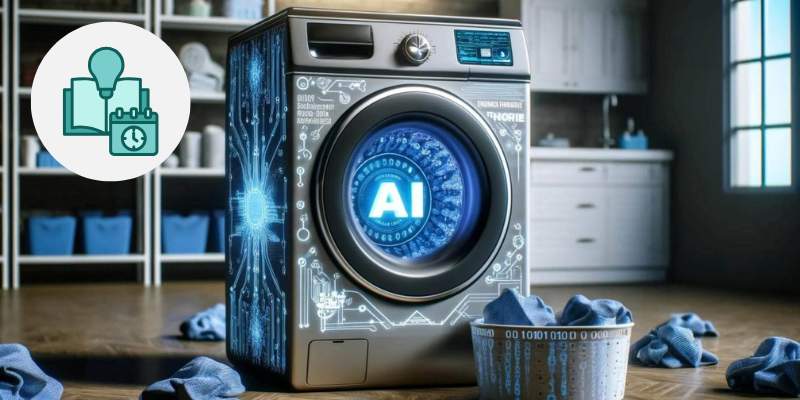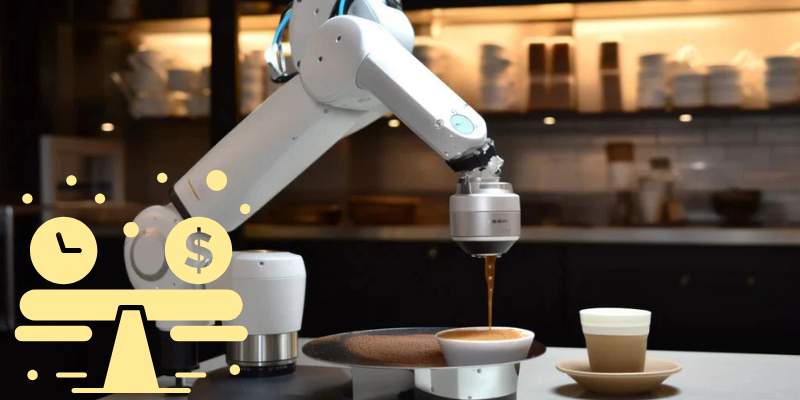Laundry. Just saying the word makes some people sigh. Piles of clothes that never seem to shrink, mystery socks that vanish into some alternate universe, and settings on the washing machine that look more like NASA controls than household buttons.
But what if the machine actually learned from you? What if it could anticipate your quirks, your rush days, and even your procrastination cycles? Welcome to the world of AI-powered washing machines—an intriguing intersection in the broader movement of AI in home.
Now, I know what you’re thinking. “Do I really need a machine that studies my laundry habits?” It’s a fair question. We live in an age where even light bulbs have become “smart.”
Are we heading into a future where our washing machines know more about us than we do? Or is this one of those rare innovations that actually makes life a little smoother, a little kinder, and dare I say, less messy?
That’s what I want to explore here: how these machines work, whether they’re actually helpful, and the emotions wrapped up in something as mundane—but oddly intimate—as doing laundry.
What Makes a Washing Machine “AI-Powered”?
When we talk about AI-powered washing machines, we’re not just talking about fancy digital displays. These machines are designed with sensors, machine learning algorithms, and connectivity features that allow them to “learn” over time.
Some of the standout features include:
- Load recognition: The machine senses how much laundry you’ve tossed in and adjusts water and detergent use accordingly.
- Fabric identification: Cameras and sensors can tell the difference between jeans, cotton shirts, and delicate fabrics.
- Cycle optimization: Over time, the machine notices what programs you favor—quick wash, eco-friendly, heavy-duty—and begins suggesting them automatically.
- Integration with home assistants: Through apps or voice controls, you can ask your washing machine to start a load while you’re still in bed.
It’s a strange but fascinating shift: the washing machine is no longer just a box that spins your clothes around. It’s a device that adapts, remembers, and responds.
The Emotional Side of Laundry
Laundry is deeply personal. Think about it: your clothes carry your sweat, your perfume, your daily life. Handing that responsibility over to a machine that claims it can “understand” you is both appealing and unsettling.
On one hand, there’s relief. Imagine a washer that remembers you always forget to switch the dial from “delicate” after washing a load of sweaters. Or one that sends you a reminder when you’ve left damp clothes inside too long. That feels almost empathetic.
On the other hand, there’s a weird vulnerability. Do I really want a machine logging how many times a week I wash gym clothes versus office shirts? It feels like having someone peek into habits I didn’t intend to broadcast. That hidden you suddenly becomes data points.
The Broader Context: The AI Rise of Ovens, Vacuums, and More
Laundry isn’t the only domestic space being reshaped. We’re living in a world where the AI rise of ovens means they can now recognize the food you put inside and adjust cooking times automatically.
We see it in Roombas AI vacuums that map out our living rooms and quietly learn when we’re out so they can clean without bugging us.
The trend is clear: our homes are evolving into learning ecosystems. Every appliance is getting smarter. But here’s the catch—sometimes these upgrades are genuinely useful, and sometimes they feel like tech companies are just throwing AI at everything, hoping it sticks.
The washing machine sits in an interesting middle ground. Laundry is repetitive, often dreaded, and yet essential. If AI can reduce the mental load attached to it, that’s a meaningful gain.
The Cost of Innovation
But let’s talk money for a minute. Because none of this comes free.
Traditional washing machines can be found for around $400 to $800. They’re simple, mechanical, and can last a decade if treated well. AI-powered models, on the other hand, often cost $1,200 to $2,000+. That’s a steep difference.
So the question becomes: are these machines worth the premium?
Numbers Worth Considering
- According to Allied Market Research, the global smart washing machine market was valued at $4.9 billion in 2021 and is projected to reach $21.2 billion by 2031, growing at a CAGR of 15.4% (source).
- Households in the U.S. do an average of 300 loads of laundry per year (EPA). That’s 300 chances for AI to show its worth—or 300 times for you to question whether it’s helping.
Personally, I sometimes think these costs feel more like paying for convenience theater. But then again, if you factor in water and energy savings, plus fewer ruined clothes from incorrect settings, the math may eventually lean in AI’s favor.
Learning Habits: Does It Really Work?
So how does a washing machine actually “learn”?
At first, it’s fairly basic. The washer records the cycles you select most often. Over time, it builds a profile.
If you’re someone who constantly chooses quick wash on weekday evenings, the machine might start suggesting that cycle automatically. If it notices you wash a lot of athletic wear, it might prioritize settings for synthetics.
But it goes beyond preferences. AI models are being trained to understand fabric types, detect stains, and adjust wash times dynamically. The machine isn’t just repeating your actions; it’s adapting to optimize results.
This sounds brilliant in theory. In practice, though, it’s a mixed bag. I’ve heard from friends who say their machines nail it after a few months—like a partner who finally learns how you like your coffee.
But others complain about false suggestions or software glitches that make them long for the good old dial.
The Environmental Angle
Let’s not forget the eco side of things. Laundry is resource-intensive.
- The average U.S. washing machine uses 41 gallons of water per load, though high-efficiency models use as little as 15 gallons (Energy Star).
- Washers and dryers combined account for about 5% of total household energy use.
If AI can consistently optimize water levels, detergent use, and cycle times, the potential for reducing waste is huge. Some models even recommend eco-friendly detergents or connect with sustainability apps.
This is where I personally get hopeful. Not because I’m a saint about environmental impact—I’m guilty of overstuffing the washer just to get it over with—but because small nudges can add up across millions of households.
The Everyday Human Struggle: Forgetfulness and Fatigue
Here’s where AI feels most human to me: when it compensates for our flaws.
How many times have you left damp clothes sitting in the washer overnight? Or started a load only to forget about it entirely until the next morning? I can’t count anymore. It’s almost embarrassing.
Some AI-powered machines now send push notifications to your phone when a load is done or when clothes risk getting musty. It feels like having a caring roommate reminding you to hang the laundry.
And honestly? Sometimes I need coffee just to survive mornings, so those reminders are lifesavers.
The flipside, of course, is notification fatigue. Do I want yet another device pinging me every hour? That’s where balance matters.
Privacy and Data Concerns
Now, let’s dive into the part that often gets brushed aside: data.
When your washing machine logs your laundry patterns, it’s technically collecting behavioral data. Some people shrug it off—what could be more boring than tracking socks? But think deeper. Laundry reveals lifestyle rhythms.
How many kids you might have. Whether you exercise regularly. Even what brands you wear if the machine is connected to detergent-recognition systems.
That’s the hidden you—the data portrait of your private life emerging from the humdrum of laundry.
And like with any connected device, questions about security and corporate use of that data are valid. Will companies use it just to improve your washing machine’s performance, or will they use it to target ads?
Maintenance and Longevity
Let’s face it: the more complex the machine, the more that can break.
Traditional washers are often repairable at a reasonable cost. With AI models, you might be looking at pricey circuit boards, software bugs, or discontinued app support. And when support ends, that “smart” machine quickly turns dumb.
This is where my skepticism kicks in. A washing machine should be a 10-year investment, not a gadget with a two-year update cycle like a smartphone. Until manufacturers commit to long-term support, that’s a red flag.
The Human Element: Is This What We Really Need?
Sometimes, I think the tech world underestimates how much people value simplicity. Yes, innovation can be thrilling. But at the end of a long day, when I’m tossing socks into a drum, I don’t always crave AI magic. I crave reliability.
That said, I also remember my grandmother’s old washing machine. It was loud, clunky, and constantly unbalanced. Would she have appreciated a machine that sensed water levels properly and saved her from mopping puddles? Absolutely.
The answer, then, lies somewhere in between. These machines can be genuinely useful—especially for families, busy professionals, and eco-conscious users. But for others, they may feel like another piece of tech creeping into intimate spaces unnecessarily.
Looking Ahead: What’s Next for AI Laundry?
The roadmap is clear: even smarter integration. Imagine washing machines that:
- Sync with your calendar to schedule loads automatically around your availability.
- Connect with wardrobes to suggest outfits based on what’s clean.
- Detect specific stains and recommend pre-treatments.
- Adjust energy use dynamically based on utility pricing.
It sounds futuristic, but these developments are already in prototype phases.
The bigger question remains: will we embrace it fully, or resist the sense that we’re outsourcing yet another small but meaningful part of daily life?
Conclusion: Help or Overhype?
So, are AI-powered washing machines worth it?
- Yes, if you value personalization, eco-friendliness, and saving mental energy.
- No, if you’d rather avoid higher costs, data sharing, and potential repair headaches.
For me, it depends on the day. Sometimes I see these machines as compassionate helpers, easing the load (literally). Other times, I roll my eyes and think, “It’s laundry. Do we really need artificial intelligence for this?”
But here’s the thing: laundry is unavoidable. If AI can make it even 20% less stressful, maybe that’s enough.
And if someday my washer greets me with “Good morning, I noticed you skipped laundry last week. Shall I start a quick load?”—well, maybe I’ll just sigh, grab a cup of coffee, and say, “Fine. Go ahead. You know me too well.”


